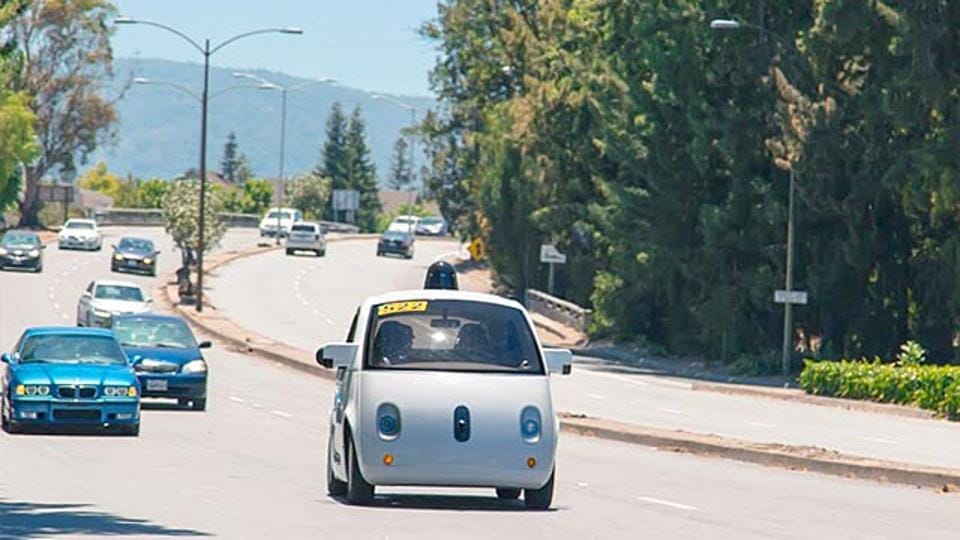China’s robocars are being lapped by their US competitors
China is getting a late start in the burgeoning field, considering California has allowed public-road testing since at least September 2014.


The autonomous Lincoln MKZ started turning left at a Beijing intersection when a speeding truck made a move to pass in front of it. Sensors in the car detected the approach and instantly froze it in place.
But that put the Lincoln directly in the truck's path, so Baidu Inc. engineer Sun Lei grabbed the steering wheel, spun it to the right and floored the accelerator to get out of harm's way. The truck zoomed by as Sun's colleague in the passenger seat calmly took notes on a tablet computer -- just another learning exercise for the self-driving fleet being tested around the nation.
"We hope to see more interventions during the road tests so that we can improve our technology,'' said Calvin Shang, general manager in charge of Baidu's intelligent driving group. "It won't help if you only run the cars on simple routes even for 10,000 or even 100 million miles.''
Though disaster was averted, the incident shows how China's push into autonomous vehicles is barely out of first gear, with only a handful of cities allowing limited trials by search-engine giant Baidu, startup Pony.ai, trucker TuSimple Inc. and others since last year. Domestic and foreign testers are putting cars, buses, trucks and delivery vans through self-driving trials to teach them how to navigate the notoriously congested streets of the world's biggest auto market.
The nation is getting a late start in the burgeoning field, considering California has allowed public-road testing since at least September 2014. That's enabling U.S. developers to lap their China counterparts, with Alphabet Inc.'s Waymo LLC logging millions of cumulative test miles in that state alone. But China's chaotic traffic has the potential to boost the self-driving industry's capabilities beyond those of the U.S.
"The U.S. is ahead right now,'' said Bill Russo, chief executive officer of Shanghai-based consultancy Automobility Ltd. "But China will soon make significant strides, and I am fully confident that by 2030 it will be a different game.''
The Chinese government set next year as the target date for large-scale adoption of early-stage AVs, and it wants 10 percent of all new vehicles sold by 2030 to be fully autonomous -— meaning hands-off driving.
The stakes are high. China's market for smart and internet-connected vehicles will generate 100 billion yuan ($15 billion) in revenue by next year, the government forecasts. The technology is core to the "Made in China 2025'' plan that's central to the U.S.-China trade war.
Yet China's approach to self-driving cars has been considerably more conservative than with electric vehicles, an industry where it's the global leader in sales.
China is so behind it ranks 20th of 25 countries in a KPMG index measuring their level of preparedness for autonomous vehicles. The Netherlands ranks first and the U.S. fourth.
There aren't any national U.S. regulations, but 41 states support autonomous-vehicle testing. The leaders include California, Arizona and Florida, according to BloombergNEF. That compares with just 14 Chinese cities allowing public-road testing.
But even after billions of dollars of research and development, the technology for autonomous vehicles is still unproven in the U.S., and none of the early leaders are making money on it.
Waymo only deploys robotaxis in one suburb of Phoenix, Uber Technologies Inc. has spent more than $1 billion without clear plans to launch a service, and Elon Musk recently said Tesla Inc.'s technology would lead to 1 million vehicles on the road that are fully capable of self-driving -- a claim met with skepticism.
In China, the national government sets minimum guidelines for testing, and local authorities can augment those while issuing permits. Cities started issuing permits in March 2018, when Shanghai gave SAIC Motor Corp. access to remote suburban streets.
By comparison, California had issued permits to 63 companies as of February 2019. They include Tesla, Volkswagen AG, Toyota Motor Corp. - and 15 China-based testers developing algorithms and honing software and sensors.
"We can't sit and wait to act,'' said James Peng, chief executive officer and co-founder of Pony. "As the Chinese government gets to understand better what self-driving technology can achieve today while ensuring road safety, they'll become more liberal and practical with the regulations.''
The leading tester in China is Baidu, which covered about 140,000 kilometers (87,000 miles) in Beijing last year -- less than a typical month for Waymo. Foreign companies such as Daimler AG and BMW AG also test, but their roadwork is limited.
China's permitting process is particularly cumbersome, said Neil Wu, a Shanghai-based partner at consultancy Roland Berger. Local authorities require each car to accumulate some miles on closed tracks and to pass several tests before granting public-road permits, and some cities require companies to renew those permits every three months.
"The current rules on public-road testing in China are limiting the amount of data and number of traffic scenarios, the two key factors for improvement in the intelligence level of robocars,'' Wu said.
The nation also needs to unify its traffic regulations, since even the basic signs can differ from city to city, said Yin Ying, deputy head of Beijing Electric Vehicle Co.'s Research & Development Center. The automaker tests robocars in the capital city.
Baidu, owner of China's biggest search engine, had permits for Beijing, Chongqing, Pingtan, Changsha, Baoding and Tianjin in the fourth quarter of last year, according to BNEF.
"The U.S. is ahead right now"
The Beijing-based company, long labelled the Google of China, is developing the equivalent of an Android operating system for AVs. The Apollo platform has about 130 members -- including Volkswagen, Ford Motor Co., BYD Co. and Microsoft Corp.
Its target year for large-scale deployment in highly autonomous, or Level 4, vehicles is 2020. Full autonomy is Level 5. During a test drive near Beijing's Daoxianghu Park, Baidu's Lincoln stopped several times while attempting left turns and braked on an empty street after its laser-based sensors misinterpreted sprinkler spray to be a wall.
"The diversity in scenarios in China will help speed up the iteration of autonomous driving technology,'' Shang said.
After testing for six months on remote Shanghai roads, TuSimple now runs autonomous tractor-trailers from the Yangshan Port to a nearby railway station, said Xue Jiancong, a vice general manager for the startup's Shanghai office. The company, which surpassed a $1 billion valuation in February, also hauls containers in Arizona.
"We believe the Chinese government will speed up to break the policy limits,'' Xue said.
Farther south, Pony operates a fleet of 20 robotaxis inside the 50-square-kilometer Free Trade Zone in Guangzhou. The startup was founded in 2016 in Fremont, California, by ex-Baidu engineers Peng and Lou Tiancheng. It's now valued at $1.7 billion, with investors including Sequoia Capital China and IDG Capital.
A three-kilometer autonomous ride from Pony's offices to a Guangzhou hotel took about 12 minutes. The car reacted to erratic bicyclists, aggressive drivers and jaywalkers by slowing down, and it was one of the few vehicles obeying the speed limit. The only abrupt stop came when the vehicle's rooftop sensors lost sight of the traffic light because of a tall truck. The chaotic conditions are exactly what Lou hopes for during the road tests.
"It is like a child learning how to swim,'' he said. "The harder the situation is, the quicker he learns.''
Catch all the Latest Tech News, Mobile News, Laptop News, Gaming news, Wearables News , How To News, also keep up with us on Whatsapp channel,Twitter, Facebook, Google News, and Instagram. For our latest videos, subscribe to our YouTube channel.


























